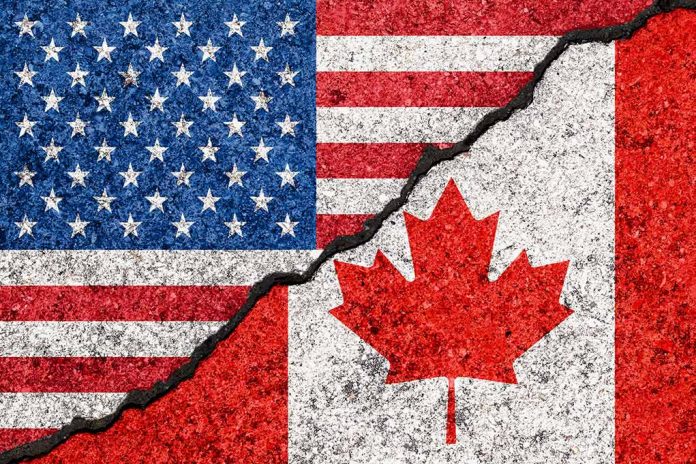
President Trump’s tariffs on Canadian goods sparked a crucial international showdown aiming to stem the tide of illicit drugs entering the U.S. from its northern neighbor.
Key Takeaways
- Trump imposed tariffs on Canadian, Mexican, and Chinese goods as an economic strategy against drug trafficking.
- The tariffs included a 25% blanket tariff on Canadian and Mexican imports, and 10% on Canadian energy and Chinese goods.
- Illegal drug trafficking, including fentanyl, was cited as the justification for these tariffs under economic emergency powers.
- Canada and Mexico retaliated with their own tariffs on U.S. goods, escalating trade tensions.
- Trump’s tariffs aim to pressurize international cooperation against drug trafficking threats.
Economic Measures Against Drug Trafficking
On February 1, 2025, President Donald Trump enacted tariffs affecting Canadian, Mexican, and Chinese imports, with a major focus on combatting drug trafficking. These tariffs, set at 25% on Canadian and Mexican goods and 10% on Canadian energy, aimed at addressing the opioid crisis linked to drugs trafficked through Canada. Utilizing legislative powers from the International Emergency Economic Power Act (IEEPA), Trump framed this as a national emergency needing urgent economic measures.
The move generated hefty economic consequences, potentially initiating a trade war. With Canada cited primarily for lacking robust anti-drug trafficking measures, the tariffs were a call for enhanced international drug enforcement collaborations. The strategies put pressure on other countries impacting U.S. security, making clear that economic relationships depend on cooperative security efforts.
President Donald Trump has announced he will impose a 25% tariff on all imports from Canada and Mexico, effective from February 1, 2025. This decision is seen as a response to issues related to border security, particularly concerning the flow of illegal drugs, including…
— Any News Any Time 24×7 (@anynewsanytime7) January 31, 2025
Retaliations and Economic Repercussions
Canada and Mexico promptly responded with countermeasures. Canada’s Prime Minister Justin Trudeau announced retaliatory tariffs affecting USD 155 billion of U.S. goods, highlighting the potential economic disruptions for both nations. Trudeau warned, “Tonight, first, I want to speak directly to Americans, our closest friends and neighbors… Tariffs against Canada will put your jobs at risk.” As this progressed, Mexico also declared retaliatory tariffs, critiquing Trump’s moves and denying allegations of alliances with criminals.
As these tariffs become entrenched in policy, they hit a substantial USD 1.4 trillion worth of imported goods annually, weighing heavily on economies. British Columbia and other Canadian provinces opposed these tariffs as violations of sovereignty, with further threats of trade disruptions.
Trump imposes 10% tariffs on China – Canada and Mexico hit with 25%
President Donald Trump signed a trio of executive orders on Saturday that imposed 25% tariffs on imports from Canada and Mexico and a 10% duty on imports from China as he sought to force the countries to clamp… pic.twitter.com/l9nQ9i3dKG
— Indo-Pacific News – Geo-Politics & Defense (@IndoPac_Info) February 2, 2025
Long-Term Implications on U.S.-Canada Relations
The imposed tariffs signal a significant shift in trade dynamics between the two nations, prioritizing national security. The decision to employ such economic levers underscores the ongoing challenges of drug trafficking and security. As the administration continues to negotiate, these tariffs have catalyzed a dialogue on international cooperation imperative to combat transnational threats.
In a social media post, President Trump clarified that tariffs are enacted “because of the major threat of illegal aliens and deadly drugs killing our Citizens, including fentanyl.”
With talks of expanding tariffs and further retaliations, the full economic impact remains to be seen. The strategies reflect a broader policy stance connecting trade to security, which may reshape future relations with Canada, underpinning the importance of mutual commitment to combating drug trafficking.





